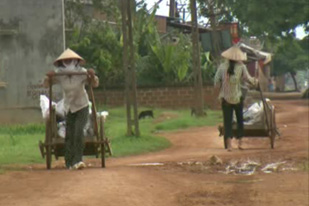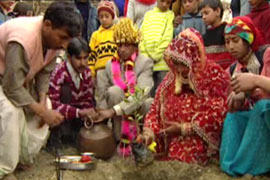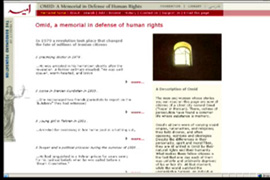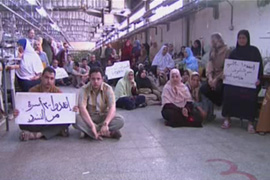
Cervical cancer
Plus planting a tree for life and a virtual memorial to Iran’s ‘disappeared’.
 |
| Eighty per cent of those who die from cervical cancer live in poor countries |
Every year around half a million women are diagnosed with cervical cancer. It is the second most common cancer in women across the world and 80 per cent of those who die from it live in poorer countries.
In developed nations, regular Pap smear testing has dramatically cut the death rate. But in countries in Asia and Africa, there is almost no screening at all.
Now there is a new vaccine that could prevent the cancer altogether. It is already being used to immunise young girls in Australia and some European countries. But it is expensive.
Everywoman reporter Ju Lin Ong went to Vietnam, where the trial vaccination programme is due to begin in September.
Shiulie Ghosh is joined from South Africa by Dr Lynette Denny, an obstetrician and gynaecologist, who has devoted her career to fighting the spread of cervical cancer, particularly in poorer communities.
Green Weddings
 |
| Tree saplings are grown and cared for by young girls |
In rural India a tradition performed as part of the marriage ceremony is helping to prevent ecological disaster. Tree saplings are grown and cared for by young girls, who then plant the tree when they get married.
It is a way of preserving the forests on which around 300 million people depend for their livelihoods. In the last year the Maiti movement, as it is known, has spread to around 8000 villages.
Everywoman went to Maloon in the foothills of the Himalayas, where the movement has taken root.
The Virtual Memorial
 |
| The website is an online memorial to the victims of the regime |
Since Iran’s revolution in 1979, thousands of people who oppose the regime have allegedly disappeared, been tortured, or even executed without trial. One such victim was Abdorrahman Boroumand, a lawyer apparently assassinated in Paris after joining a pro-democracy opposition party.
His two daughters, Roya and Ladan, now living in Washington DC, began tracking down the names of all those victimised by the regime.
Now they have created a website; an online memorial to commemorate those victims and promote human rights. They call the database OMID, which is the Farsi for “hope”.
Watch this episode of Everywoman here:
Part 1:
Part 2:
EGYPT STRIKES – What has happened since we aired this story
 |
| Egyptian Women strike for better pay |
A couple of weeks ago Everywoman brought you the story of the women on strike in Egypt for better pay and conditions.
The good news is that the women have struck an agreement at the parliament between the parties involved in the Mansoura-España Gamrnets Company crisis.
The agreement to be in effect starting today, was brokered in a meeting that included: Hussein Megawer, the head of General Federation of Trade Unions, Mohamed Adel el-Sanhoury and Haitham Ahmad Atef of the United Bank, Nahed el-Ashry of the Labor Ministry, Said el-Gohary, the head of the General Union of Textile Workers, and head of the Factory Union Committee Hamdi el-Maghrabi and his deputy Adel Hassaballah….
1. The workers’ May salaries will be paid today. The June salaries will be paid next Thursday.
2. The May Day grants from 1 July 2006 to 31 May 2007 will be paid today (LE10 per month =LE110 for each worker)
3. The social bonuses for the year 2006 will be paid, with a minimum LE30… Moreover it will be paid to all workers, whether they have contracts or not.
4. (MORE IMPORTANTLY) The Company WILL NOT BE LIQUIDATED. The United Bank pledged work will continue in the factory. If the bank fails to pump investments into the company and decides to sell it, the selling agreement must include guarantees from the new investor to keep the company going without firing a single worker, or cutting (the already ultra-low) the workers’ salaries. This means the bank cannot sell the company, as rumoured, to the neighboring Delta Academy as a real estate property to be razed.
5. No worker who took part in the industrial action will be victimized. The sacking decrees given to trade unionist Mohsen el-Sha’er and the five women workers are revoked.
6. A committee, headed by Hussein Megawer, has been formed to supervise the implementation of the agreement including the officials, managers and trade unionists who were present in the parliamentary session. This committee will also look into the rest of the workers’ demands that have to do with the unpaid bonuses and May Day grants (now prior to 2006).
The workers in the factory are expected to disband their sit-in today, after they receive their May salaries. “We are optimistic this time,” a worker told me over the phone. “We are happy there will be no victimization, and that the company will continue. Where else would we have gone? The street? The management now knows what we are capable of. We will disband the sit-in after we get paid tomorrow (i.e., Thursday). If they don’t give us the rest of our rights we will occupy the factory again.”
To contact us click on ‘Send your feedback’ at the top of the page